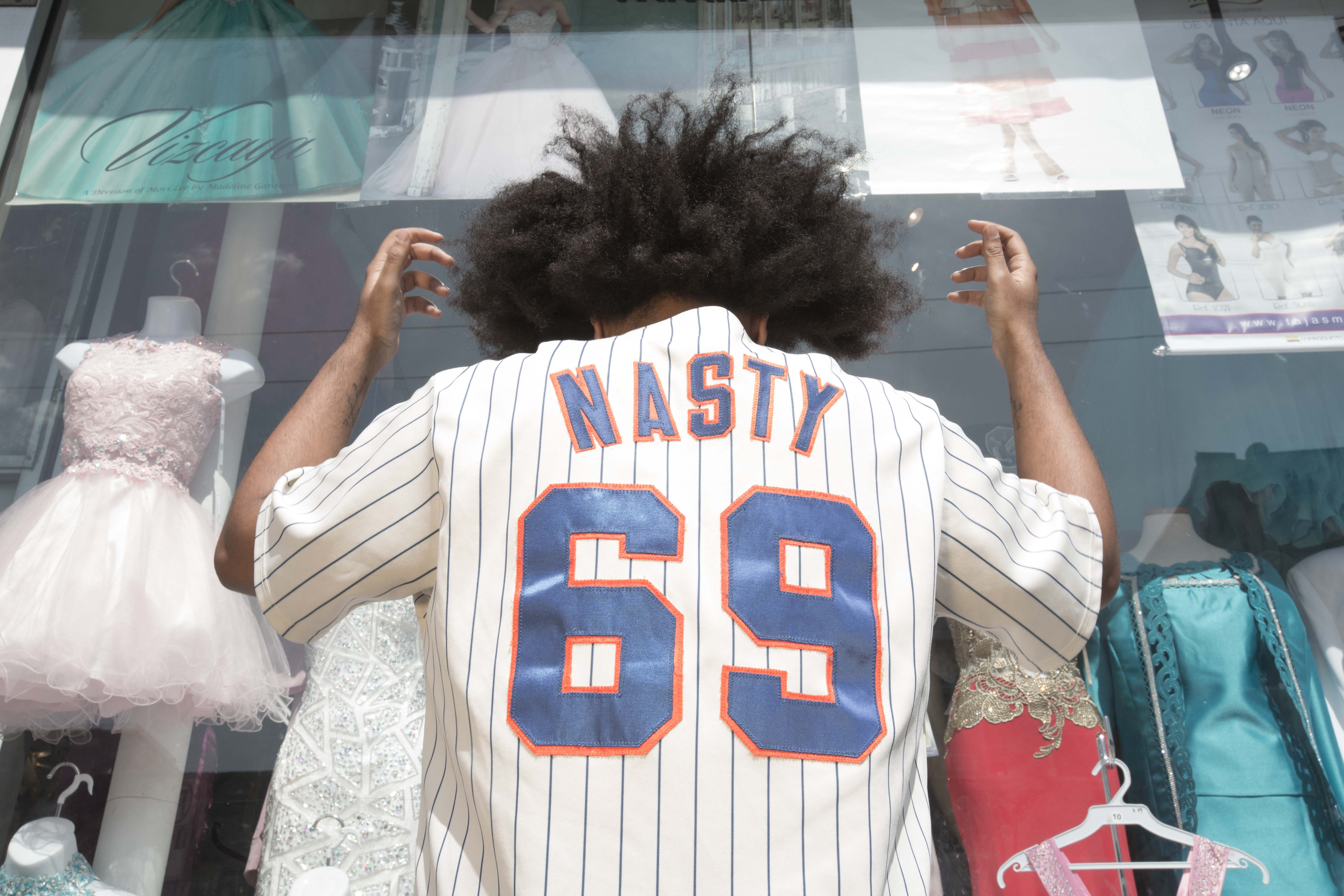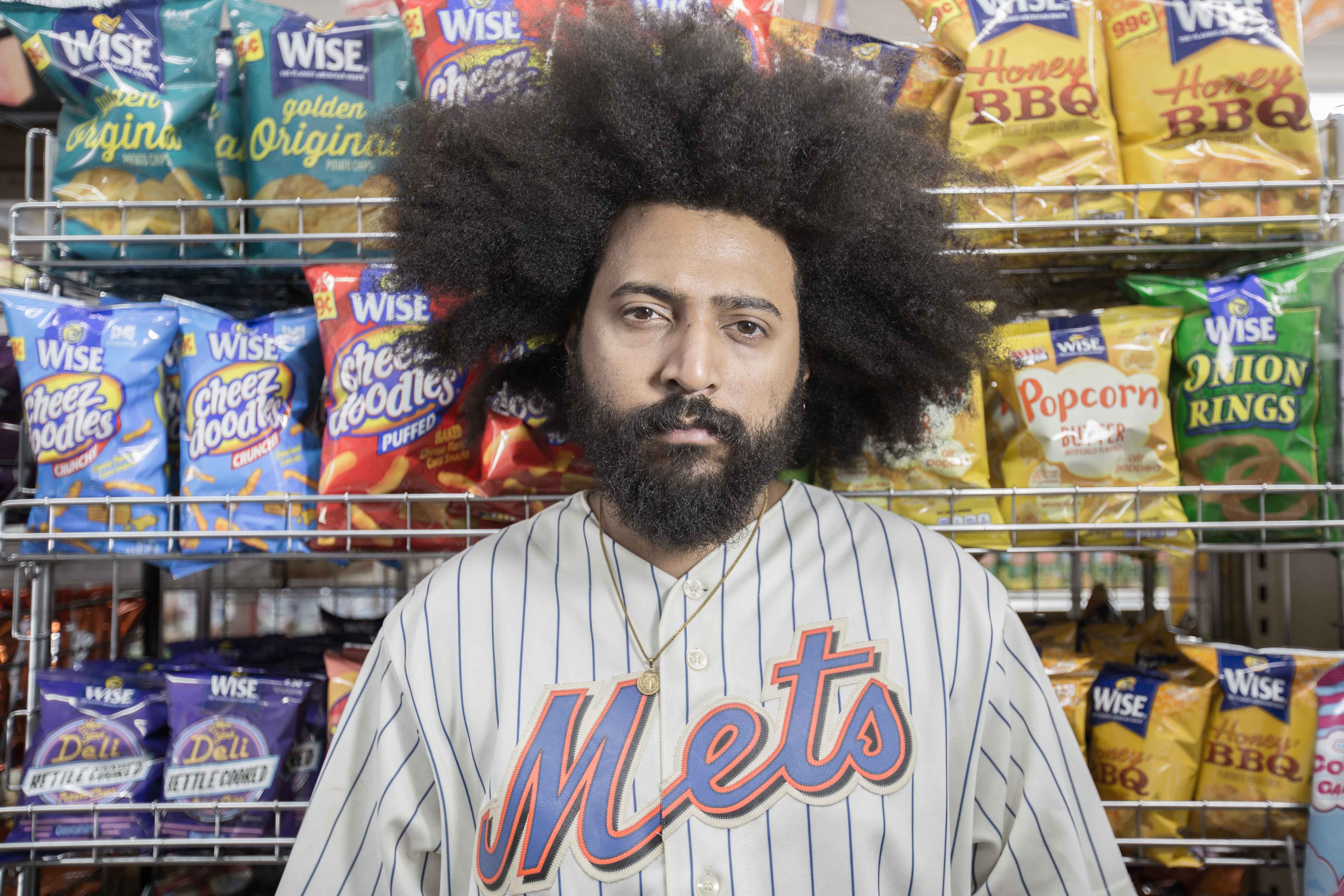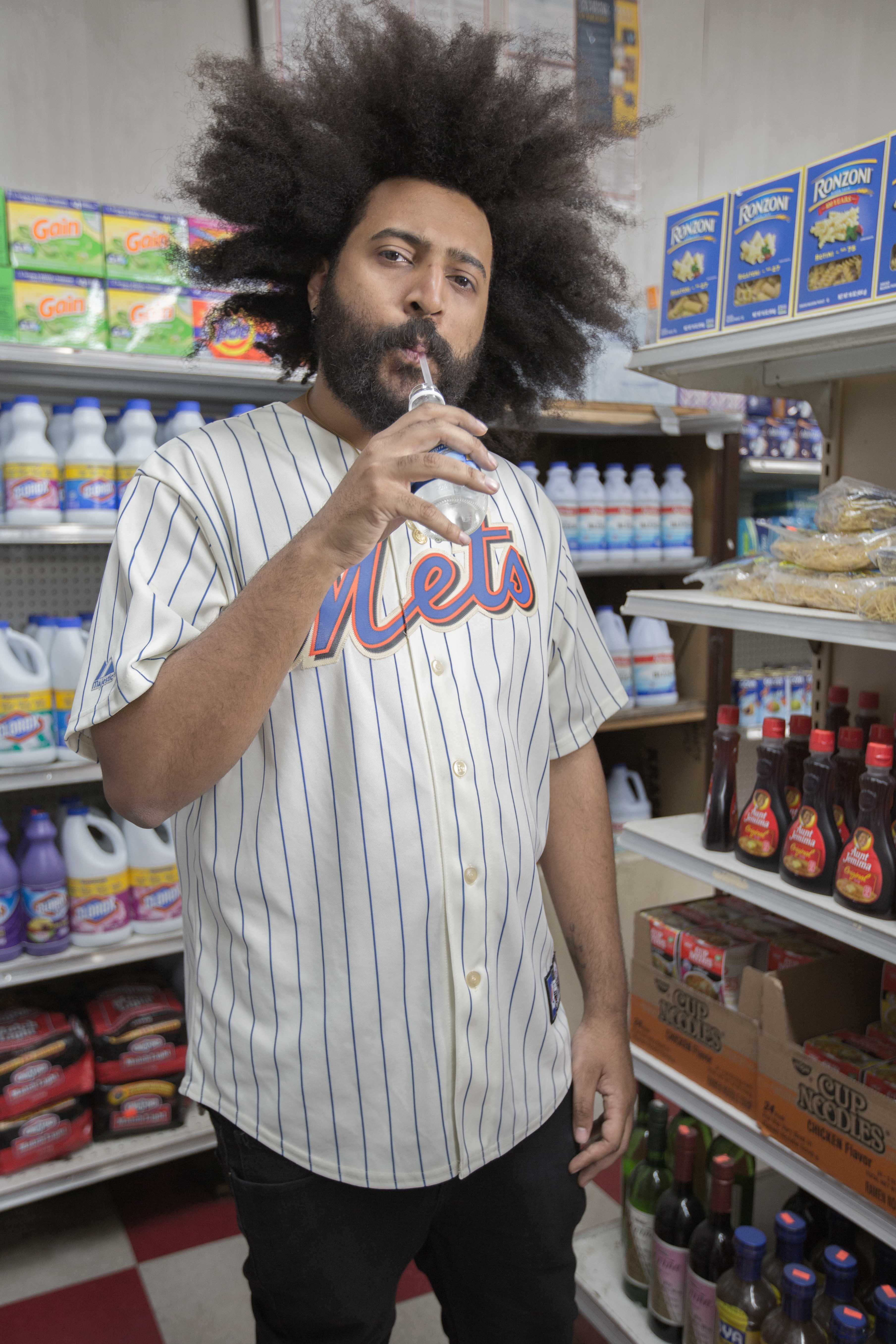Queens-born rapper Nasty Nigel strolls into our office wearing an oversized Mets jersey, embroidered with the number “69” and the word “nasty” in blue. He’s visibly hungover from catching close friend and Mixpak producer Jubilee spin at Output last night, but I quickly realize that exhaustion is part of his charm and breezy demeanor. Soon enough, the conversation flows freely and earnestly, as we talk Dominican mujeriegos, James Bond movies, and where to find the best dim sum in Flushing.
Born and raised in the Corona neighborhood of Queens, the music industry first got to know Joshua Nigel Reynoso through World’s Fair, a six-man collective whose wisecracking, painfully honest rhymes recall New York hip-hop’s storytelling history. Now, Nigel is going solo, but the candor and real-recognize-real flow he brings to his music is still alive and well. I talk to him about growing up in an outer borough with Dominicans and Italians. “It gave me the attitude that I have. You put the 90s aggressiveness of a Dominican or an Italian [on a track] and it’s just super in your face,” he offers. That becomes evident through some of his influences; he cites Jay-Z and Nas’ beef as a source for inspiration, as well as A Tribe Called Quest, but as he puts it, he was into “the jiggier shit,” like Mobb Deep and DMX, and the “flashiness and greediness” of the late 90s and early 2000s sound.

It’s also why some of his earliest songs were middle school diss tracks, recorded on now vintage Dell computers. “I want to say I was 12 and I just graduated…You know like, ‘Hey man, you have bad skin.’ Or like, ‘You tried to holla at this girl, but she got with this dude,’” he snickers.
When I ask him how he evolved from recording pre-pubescent banter to adopting his graffiti name Versa to becoming Nasty Nigel, he points the finger at hip-hop’s suffocating braggadocio. “I never wanted to be like ‘I’m the best rapper In the world; I want to conquer New York and have a crown.’ I really don’t give a fuck about that shit. I just want to have fun,” he declares. “The whole thing came from: when you call somebody nasty, he’s like a nasty rapper, the most lyrical shit on earth. I’m like, ‘No, I’m going to be actually nasty.’ Like a disgusting human being.”
“It’s all love, because our common goal is to stand up for New York.”
And thus, Nasty Nigel was born. Like many New York-born MCs of Dominican descent, Nigel has escaped the “Latin rapper” label, largely because of his blackness, as well as a savvy self-presentation strategy he calls “skin and bones.” Though the Latinidad of MCs like Juelz Santana, Fabolous, and AZ is hidden in plain sight, it’s hard for many outsiders to conceptualize Dominican identity as fundamentally black. That is both a blessing and a curse, as Nigel has been fortunate enough to avoid being pigeonholed.
But it doesn’t mean he’s not here to rep the island, either. “Just because I’m Latino, it doesn’t really change anything. If anything, I can tell a different story in the same common language that we all speak. I could throw in a couple words that you’ve never heard of, and it adds to your dictionary…I can rap in English and say shit in Spanish and that’s it.”

Reynoso plans on bringing that wisdom to his upcoming EP El Utimo Playboy: La Vida Y Los Tiempos De Nigel Rubirosa, which is set to drop this summer, before he heads to the DR for the first time in over a decade. “I think it’s super honest,” he tells me. Read more of our conversation below, and check out the Rodney Hazard-produced “1979 Baby Blue,” a loosie Nigel is dropping to tease the upcoming EP.
On What He Loves About New York Hip-Hop
I like that all my friends are killing it [laughs]. New York is super small, and it’s also super big. My experiences are completely different from, let’s say, [Flatbush Zombies]. I know them from doing music in the same circuit, but they live in Flatbush; that’s a completely different world. They have so many other things to say than I do. We have different views on things and the fact that we can get together and make music is the coolest shit. It becomes this universal tool and I love that about New York, because New York can be super standoffish and super clique-ish, but New York doesn’t – I mean, it’s there, that gang culture and gang mentality, but it’s not like Chicago. There, blocks for blocks it’s like, “I don’t fuck with this block.” I’m from Queens and homies are from uptown and we can get together. It’s all love, because our common goal is to stand up for New York.
“Nobody is interested in being raw anymore.”
On His Alter Ego Nigel Rubirosa
I got it from Porfirio Rubirosa. He was this Dominican playboy from the 40s and 50s. I feel like they modeled James Bond after him and they don’t want to give the credit. From what I’ve gathered, he slept with various women to extract information for the dictator [Rafael Leonidas Trujillo] at the time. He was like a fucking spy. In that sense, like James Bond. He was a straight up womanizer, romanticizing and extracting information – he kinda fucked his way to the top. He became a real life playboy. I got it from that, because as a Dominican, we’re kind of known as that.
On What to Expect from El Ultimo Playboy
I feel like people needed to know who I was. It’s really hard to develop a character, especially when you’re part of a group that’s part of an even larger collective. I don’t ever get to tell my full story, and I feel like for you to fully enjoy the group, you need to know who everybody is individually. I feel like with this, once you listen to it, it makes perfect sense what I said on previous projects.
Nobody is interested in being raw anymore, and it’s cool if people want to take music the way that they’re taking it – if they want to glamorize something or if they want to be specific about some kind of lifestyle, but I feel like nobody’s taking from real-life, day-to-day experiences.








